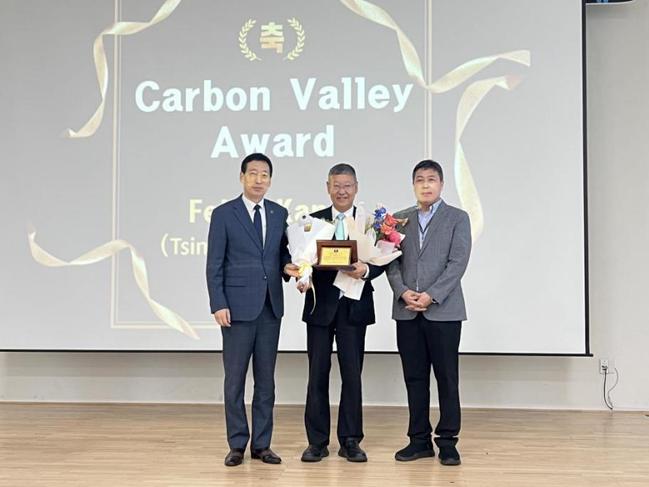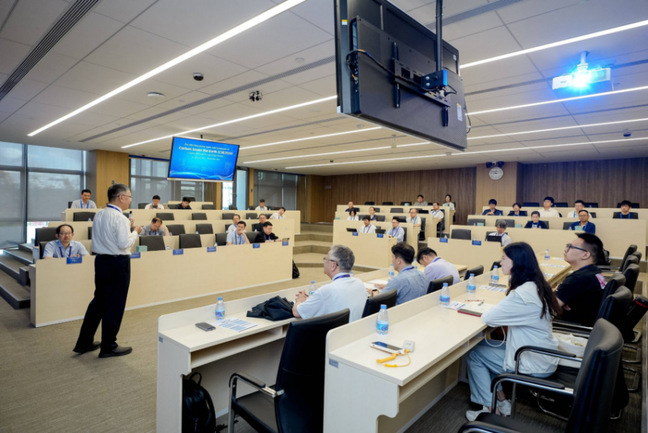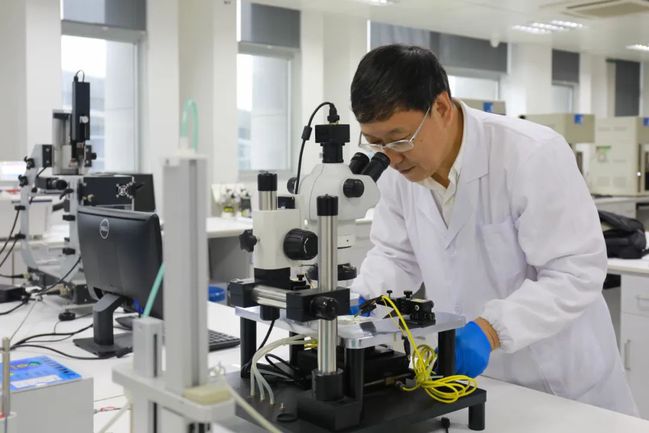On May 23, 2025, Professor Kang Feiyu from Tsinghua Shenzhen International Graduate School (Tsinghua SIGS) was honored with the "Carbon Valley Award" by the Korean Carbon Society. This prestigious award recognizes scientists who have made outstanding contributions to the research, development, and industrialization of carbon materials. With over 30 years of dedication to carbon materials research, Professor Kang has consistently achieved technological breakthroughs, fostered industry-academia collaboration, and has played a proactive role in fostering exchanges and cooperation in both academic and applied research on carbon materials.

Prof. Kang Feiyu (center) receives the Carbon Valley Award from the Korean Carbon Society
Bridging International Collaboration: The Endless Exploration of Carbon
In 2003, Professor Kang Feiyu jointly initiated and organized the China-Korea-Japan Joint Symposium on "Carbon Saves the Earth" (CSE). Rotating among the three countries, the symposium has now been held 19 times, fostering exchanges and collaboration among scientists and enterprises in the carbon materials field across China, South Korea, and Japan.
"When we conceived the theme, we envisioned carbon materials saving the Earth. It seemed like a great aspiration back then, but after more than 20 years of development, the combined efforts of academia and industry have gradually turned this vision into reality," Professor Kang Feiyu said.

Prof. Kang Feiyu chairs the opening ceremony of CES in Shenzhen, July 2024
Through these nineteen symposia, exchanges of ideas have propelled advancements in carbon materials technology. Numerous cooperative initiatives have facilitated the transformation of carbon materials technology and industrial development, deepened trilateral exchanges, and paved an international path of collaboration in carbon materials research.
"This award strengthens my resolve to further deepen the exchange and cooperation in carbon materials among China, Korea, and Japan. I will strive to make greater contributions to international collaboration in this field," Professor Kang noted.
Harnessing Carbon's Power: Expanding the Path of Industry-Academia-Research Integration
Prof. Kang Feiyu primarily engages in research on carbon materials and their applications in energy and environmental fields. For over 30 years, he has led his research team in deep processing and application technologies of natural graphite, significantly advancing the use of natural graphite anodes and graphene conductive agents in lithium-ion batteries. In 2017, the project "Graphite and Graphene Materials for High-Performance Lithium-Ion Batteries," where Professor Kang was the primary inventor, won the Second Prize of the National Technology Invention Award.

Prof. Kang Feiyu at work in the lab
Professor Kang believes perseverance is key in research. "For over 30 years, I have adhered to my convictions and progressed step by step; persistence ultimately rewards."
"Carbon is black, yet it can provide green energy and create a sustainable environment for humanity," Professor Kang said. He emphasized the immense potential of carbon materials in energy and environmental protection, making them hot topics in both academia and industry.
While advancing the frontiers of scientific theory, Professor Kang has consistently focused on translating carbon materials technology from the lab to the market. By fostering close industry-academia collaboration, he has facilitated the large-scale application of natural graphite and graphene in lithium batteries. To date, over 40 of his patents have been successfully transferred and applied.
"A laboratory technology ultimately needs to be scaled for industrial application. As researchers, we must genuinely listen to and address industry needs, communicate and cooperate sincerely. Only then can we achieve true industry-academia-research integration, empower industrial development, drive societal progress, and unleash the power of science and technology," Professor Kang stated.
Edited by Peng Bin & Wan Xinyi
Reviewed by Nie Xiaomei


